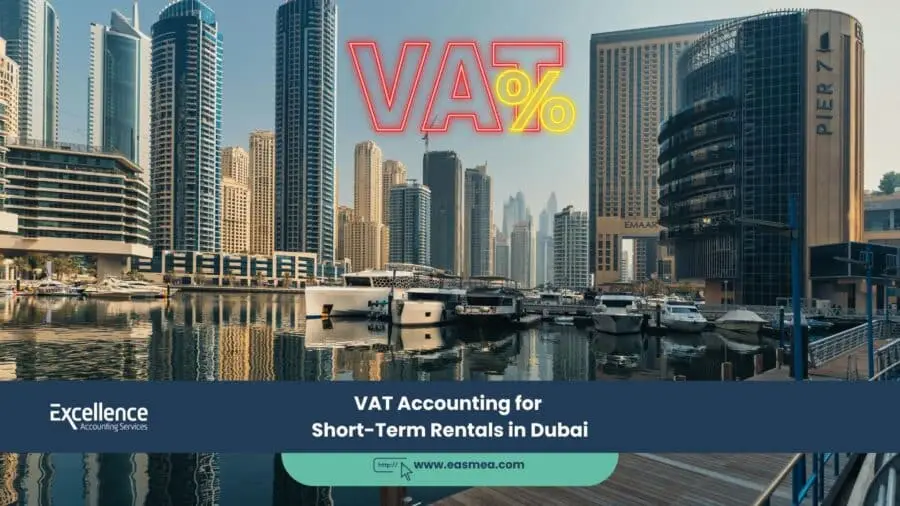Navigating the world of short-term rentals in Dubai can be exhilarating, but it comes with its own set of challenges. One crucial aspect that often catches owners off guard is UAE Value Added Tax – VAT accounting. Whether you’re renting out a cozy apartment or a lavish villa, understanding VAT accounting is essential to ensuring compliance and maximizing profitability.
- Understanding the Value Added Tax (VAT) in Dubai
- Impact of VAT on Short-Term Rentals in Dubai
- Who Needs to Register for VAT in Dubai?
- How to Register for VAT as a Short-Term Rental Owner
- Managing and Reporting VAT for Short-Term Rentals
- Common Mistakes and Pitfalls to Avoid with VAT Accounting
- Conclusion: Benefits of Properly Managing VAT for Short-Term Rentals
Dubai has established itself as a hotspot for tourists and business travelers alike, making the short-term rental market more competitive than ever. As an owner, you want to ensure your financial practices keep pace with this dynamic environment. From potential tax liabilities to registration requirements, there’s plenty to consider.
This blog will guide you through the complexities of VAT accounting specific to short-term rentals in Dubai. So let’s dive into how proper management can not only help you stay compliant but also enhance your rental experience!
Understanding the Value Added Tax (VAT) in Dubai
Value Added Tax (VAT) is a consumption tax applied to goods and services in Dubai, set at a standard rate of 5%. This tax was introduced in January 2018 as part of the UAE’s efforts to diversify its economy.
VAT Accounting applies at each stage of the supply chain. When you provide short-term rental services, you’re not just charging for accommodation; you are also subject to this tax on your service fees. Understanding how VAT Accounting works is crucial for compliance.
Businesses that exceed an annual turnover threshold must register for VAT. However, even if your earnings fall below this limit, it’s wise to familiarize yourself with VAT regulations since they can impact pricing strategies and profitability.
Being knowledgeable about VAT helps ensure that you pass on costs appropriately while avoiding unforeseen liabilities. This understanding sets the foundation for effective accounting practices tailored specifically for short-term rentals in Dubai.
Impact of VAT on Short-Term Rentals in Dubai
The introduction of VAT in Dubai has reshaped the landscape for short-term rentals. Property owners must now consider this additional tax when setting prices, which can affect their competitive edge.
Guests might expect lower rates than traditional hotels but will need to factor in VAT costs. This can lead to increased overall expenses for travelers, potentially impacting booking decisions.
For hosts, understanding how VAT works is crucial. Incorrectly charging customers or failing to account for it can result in financial penalties and strained relationships with clients.
Moreover, compliance with VAT regulations requires diligent record-keeping and timely reporting. This adds a layer of responsibility that many short-term rental operators may not have anticipated when entering the market.
Navigating these changes successfully means adapting business strategies while remaining attuned to guest expectations and market dynamics.
Who Needs to Register for VAT in Dubai?
In Dubai, not everyone is required to register for VAT. Understanding who falls under this obligation is crucial for short-term rental owners.
If your taxable supplies exceed AED 375,000 annually, you must register. This threshold includes income from all sources of business activity.
Even if your earnings are below that limit, voluntary registration can be beneficial. It allows you to reclaim input tax on expenses related to your rentals.
Moreover, if you’re part of a group of companies operating together as a single entity for VAT purposes, the rules may differ slightly. Group registration might apply in such cases.
Short-term rental operators offering services like cleaning or maintenance could have different considerations too. These additional services can impact the overall revenue calculation for VAT registration and obligations.
Staying informed about these requirements ensures compliance and helps avoid potential penalties down the line.
Understanding who needs to register for VAT in Dubai is crucial for anyone involved in short-term rentals. The Federal Tax Authority (FTA) has set specific criteria that determine whether a business must register.
If your annual taxable supplies exceed AED 375,000, you are required to register for VAT. This threshold includes all revenue generated from short-term rental activities, such as renting out apartments or villas on platforms like Airbnb and Booking.com. If your income falls below this amount but exceeds AED 187,500 annually, you may still opt for voluntary registration.
It’s also important to remember that even if you’re only managing one property or operating part-time, the total income across all rental properties counts toward the threshold. Therefore, keeping accurate records of your earnings is essential.
Additionally, foreign investors and companies providing short-term accommodation services might encounter different regulations when it comes to VAT registration. Understanding these nuances can help avoid potential penalties and ensure compliance with local tax laws.
For those entering the market or already established in short-term rentals in Dubai, staying informed about VAT accounting requirements will streamline operations and safeguard profits effectively.
How to Register for VAT as a Short-Term Rental Owner
Registering for VAT as a short-term rental owner in Dubai is essential for compliance. The process begins by determining if your annual taxable turnover exceeds the mandatory threshold of AED 375,000.
Once confirmed, visit the Federal Tax Authority (FTA) website. There, you’ll find an online registration portal that guides you through the necessary steps.
Prepare to submit key documents such as your Emirates ID, proof of business activity, and financial records detailing your earnings from rentals. These documents help validate your application.
After submission, expect a response within five working days. If approved, you’ll receive a unique VAT registration number crucial for invoicing and reporting purposes.
Remember to maintain accurate records of all transactions related to your short-term rentals. This will simplify future tax filings and ensure you’re always audit-ready.
Additionally, it’s advisable to consult with a tax professional or accountant to ensure you understand your obligations and how to comply with VAT regulations. They can also assist with setting up proper invoicing systems and filing tax returns on time.
Once registered, you’ll need to charge VAT (currently 5%) on all short-term rental transactions and remit the collected amount to the FTA on a regular basis. Failure to comply with VAT regulations can result in penalties and fines.
In conclusion, registering for VAT as a short-term rental owner is a straightforward process that requires proper documentation and compliance with regulations. By staying organized and keeping accurate records, you can easily fulfill your VAT obligations and avoid any potential issues in the future.
Managing and Reporting VAT for Short-Term Rentals
Managing VAT for short-term rentals requires a keen eye on your financial records. Keep track of all income and expenses related to your rental properties. This will make reporting much easier.
Utilize accounting software tailored for VAT compliance. Such tools can automate calculations, minimizing errors that could lead to penalties.
When it’s time to report, ensure you have detailed invoices from service providers. These documents support your claims for input tax recovery on expenses incurred while operating the rental.
Filing deadlines are crucial; missing them can result in fines or interest charges. Set reminders well ahead of due dates to stay organized and compliant.
Maintain clear communication with clients about VAT charges included in their booking fees. Transparency fosters trust and avoids confusion over costs associated with short-term stays in Dubai’s competitive market.
Managing VAT for short-term rentals involves thorough record-keeping and timely reporting. As a property owner, it’s essential to maintain accurate records of all transactions related to your rental services. This includes invoices, receipts, and any other documents that reflect income and expenses.
Regularly updating your financial records will simplify the process when it comes time to file your VAT returns. The UAE authorities require businesses to submit quarterly or annual VAT returns depending on their turnover. These returns must include details about the taxable supplies you’ve made during the relevant period.
It’s advisable to consult with an accounting professional who specializes in UAE VAT accounting for short-term rentals in Dubai. They can help ensure compliance with local laws and regulations while optimizing tax liabilities.
Keeping up-to-date with changes in legislation is also crucial as tax laws evolve frequently. By staying informed, you can effectively manage your obligations while maximizing profitability from your rental properties. Embracing these practices will not only enhance compliance but also contribute positively towards sustaining a successful short-term rental business in Dubai’s vibrant market.
Common Mistakes and Pitfalls to Avoid with VAT Accounting
Many short-term rental owners in Dubai overlook the importance of keeping accurate records. Failing to document all transactions can lead to significant issues during audits.
Another common mistake is misclassifying supplies and services. It’s crucial to differentiate between taxable and exempt items, as this affects VAT calculations directly.
Some property owners forget about claiming input tax on business-related expenses. Not taking advantage of these claims means losing out on potential savings.
Additionally, neglecting timely VAT returns can result in penalties. Staying organized with deadlines is essential for avoiding unnecessary fines.
Many underestimate the complexity of VAT regulations in Dubai. Seeking professional advice can provide clarity and ensure compliance with current laws, helping you navigate any uncertainties effectively.
Conclusion: Benefits of Properly Managing VAT for Short-Term Rentals
Properly managing VAT for short-term rentals in Dubai offers a range of benefits. Compliance with the regulatory framework helps avoid penalties and fines. This not only secures your investment but also reinforces your reputation as a responsible landlord.
Additionally, understanding and implementing effective VAT accounting can enhance cash flow management. Accurate records ensure you know exactly what you owe and what you can reclaim, making financial planning more straightforward.
Moreover, being knowledgeable about UAE VAT regulations allows rental owners to maximize their profitability. By factoring tax implications into pricing strategies, landlords can remain competitive while still covering costs.
Establishing transparent practices fosters trust with clients and local authorities alike. A well-managed approach to VAT demonstrates professionalism and commitment to high standards in service delivery.
Embracing these principles leads to smoother operations and greater peace of mind as you navigate the vibrant world of short-term rentals in Dubai.
Properly managing VAT for short-term rentals in Dubai can lead to significant benefits. First and foremost, compliance with tax regulations helps avoid hefty fines and legal issues that can arise from mismanagement. When you stay on top of your VAT accounting, it not only streamlines your operations but also enhances your credibility as a rental owner.
Additionally, effective VAT management allows you to accurately price your rentals. This transparency can attract more guests who appreciate knowing what they are paying for upfront. Moreover, understanding how to manage VAT effectively opens up opportunities for claiming input tax credits on expenses related to the rental property.
Investing time into learning about VAT implications means less stress down the line. You’ll be better equipped to handle financial statements and reports required by authorities or potential investors. Ultimately, mastering VAT accounting paves the way for a smoother operation of short-term rentals in Dubai while maximizing profitability and ensuring long-term success in this competitive market.
FAQs:
VAT (Value Added Tax) is a tax imposed on the consumption of goods and services in many countries, including the UAE. It applies to short-term rentals in Dubai as they are considered a form of commercial activity.
2. How can properly managing VAT benefit rental owners in Dubai?
Properly managing VAT for short-term rentals can offer several benefits, including avoiding penalties and fines, enhancing cash flow management, maximizing profitability, and fostering trust with clients and local authorities.
3. How can landlords ensure compliance with VAT regulations for their short-term rentals?
Landlords can ensure compliance by registering for VAT, charging the appropriate tax rate on their rental fees, keeping accurate records of income and expenses, filing tax returns on time, and paying any taxes owed.
4. Can rental owners claim input tax credits on expenses related to their short-term rental property?
Yes, landlords can claim input tax credits on expenses such as maintenance, utilities, furniture and equipment purchases, and marketing costs related to their short-term rental property.
Properly managing VAT for short-term rentals can offer several benefits, including avoiding penalties and fines, enhancing cash flow management, maximizing profitability, and fostering trust with clients and local authorities.
3. How can landlords ensure compliance with VAT regulations for their short-term rentals?
Landlords can ensure compliance by registering for VAT, charging the appropriate tax rate on their rental fees, keeping accurate records of income and expenses, filing tax returns on time, and paying any taxes owed.
4. Can rental owners claim input tax credits on expenses related to their short-term rental property?
Yes, landlords can claim input tax credits on expenses such as maintenance, utilities, furniture and equipment purchases, and marketing costs related to their short-term rental property.
Landlords can ensure compliance by registering for VAT, charging the appropriate tax rate on their rental fees, keeping accurate records of income and expenses, filing tax returns on time, and paying any taxes owed.
4. Can rental owners claim input tax credits on expenses related to their short-term rental property?
Yes, landlords can claim input tax credits on expenses such as maintenance, utilities, furniture and equipment purchases, and marketing costs related to their short-term rental property.
Yes, landlords can claim input tax credits on expenses such as maintenance, utilities, furniture and equipment purchases, and marketing costs related to their short-term rental property.





